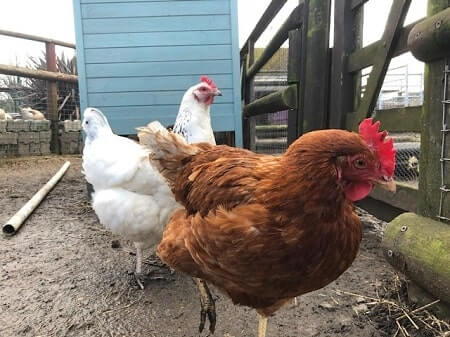Looking for a chick grit substitute? Not sure if you need to supplement your chicks or chicken’s diet with grit?
Here’s everything you need to know regarding why chicks need grit in their diet, if they need grit, and what you can use as grit:
Table of Contents
Why Do Chicks Need Grit?
Most backyard chicken or new chick owners are aware that chickens need grit in their diet, but not many people know exactly why.
Understanding why chicks need grit will help you better understand if you need to provide them with grit, and which type of grit is best.
In essence, chicks and chickens need grit in their diet to help them digest their food.
Chickens do not have teeth, so they cannot chew up food before swallowing it. They peck at food to break it up a little, then swallow it whole.
Food first gets stored in an area called a crop. This enables birds to eat a lot of food, typically throughout the day, then move it on for digesting overnight.
When the food leaves the crop, it travels into their stomach called the gizzard, where it mixes with digestive enzymes and is physically ground up or “chewed” into pieces.
The gizzard is basically a strong muscle that contracts. It’s here where grit is used to help break up the food into smaller pieces.
After being ground up on the gizzard, the food then passes into the small intestine where the nutrients are absorbed and the waste is passed.
Do You Need to Give Your Chicks Grit?

I see the topic of whether or not chicks and chickens need grit commonly discussed. For me, it comes down to a few basic rules:
If your chicks are eating anything other than a commercial feed, you’ll likely need to provide some grit.
The reason I say this is because chick feeds are typically formulated to be either easy to digest, or they have grit included. It’s worth checking the packaging carefully to find out for sure.
So, additional grit as a supplement is only usually required if and when you start giving them foods to eat other than their feed.
I know some owners that provide a little grit anyway, even though their chicks are only eating a feed. Their reasoning is that a little grit will only do good, especially if they need it.
The same applies to adult chickens. If they are only eating a commercial feed, check if it states that grit is not required to digest it.
Otherwise, you’ll need to provide some grit. Unless that is, they’re able to get a grit substitute from foraging and picking up small stones and other debris that works as grit.
What Can You Use as a Grit Substitute?
If you’re not able to pick up commercial grit for your chicks, you do have other options.
The most common grit substitute I see used for chicks is regular play sand. It’s very fine, is small, and feels very similar to shop-bought chick grit. In fact, chick grit might just be sand, I’m not sure!
I know a lot of people also use grit intended for small birds like canaries and budgies. So, if your local store doesn’t stock chick-specific grit, check for a fine bird grit.
Failing either of these options being possible, you could look for small stones outside. This is difficult to do if you’ve never seen and felt chick grit though, it really needs to be right.
Commercial grit typically comes in two sizes. Very fine grit, which is for chicks, and larger grit, which is for adult chickens.
There’s nothing special about shop-bought grit, it’s just coarse sand, small stones, and other hard types of material. No different to what chickens find for themselves while foraging in the wild.
What Happens If Chickens Don't Have Access to Grit?

If chickens are eating foods that require grit to help break them down in their gizzard, there are some potential health issues associated with not getting enough grit.
The main issue is that they can’t break up and digest their food. This means they will not be getting the much-needed nutrients from the food, but worse, the food will be “stuck” in their digestive tract.
Obviously this can cause all kinds of problems and discomfort. Including a condition known as “sour crop”.
Sour crop is caused when the crop can’t or doesn’t empty - often due to an excess of food in it or food backed up by a blockage.
As a result, the food starts to ferment which causes fungal infection. For mild infections, you should be able to massage the crop and ease the blockage with the aid of olive oil.
Serious infections will require the assistance of an avian vet as they’ll need to make an incision into the crop to remove the blockage.
Then there’s the issue of food stuck further along in their digestive systems. This will likely also require the assistance of a vet.
Related - Benefits of Epsom salt for chickens.
In Summary
You now know why chicks and chickens need grit in their diet, what grit is and some of the alternatives and substitutes you can use, and how to provide it to them.
Something else I want to point out is that it is possible for chickens to eat too much grit, so I don’t leave out a lot more than they require.
Resources
Image credits - Photos by Jason Leung and Zoe Schaeffer on Unsplash
Sour crop in chickens - TheArtOfDoingStuff.com




